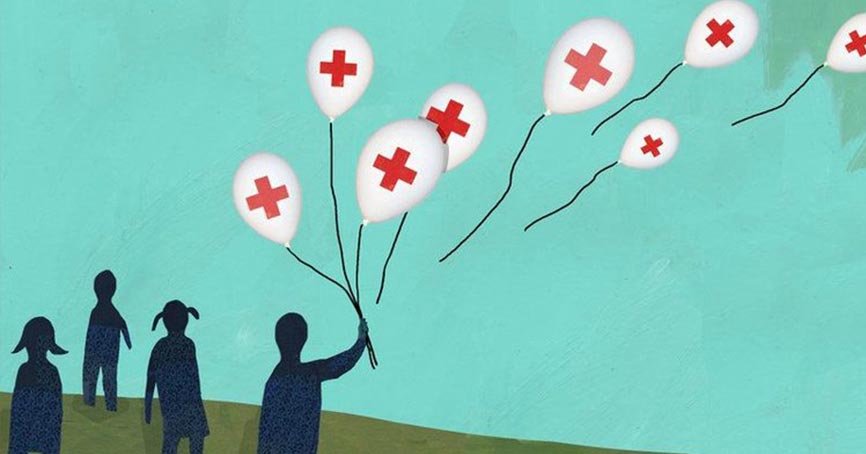- Sudden Cardiac Death (SCD) most often occurs in patients with heart disease. It mainly affects those who have congestive heart failure and have had a heart attack.
- About 92% of people who experience sudden cardiac arrest do not survive.
- The prevalence of SCD is almost 10 times higher than the incidence of death from breast cancer.
- Patients die within minutes if they do not receive instant treatment. To survive, a patient' needs immediate CPR and treatment with a defibrillator.
What Is Sudden Cardiac Death (SCD)?
Sudden cardiac arrest (SCA) and sudden cardiac death (SCD) are kind of similar. They refer to the unexpected cessation of the cardiac function.
The condition is known as SCA if a treatment (e.g., defibrillation) or spontaneous reversion restores circulation. On the other hand, the condition is called SCD if the patient dies.
Simply put, SCD happens when a patient experiences unexpected loss of cardiac function and the heart immediately stops beating. Unless resuscitative treatment is given immediately, cardiac arrest leads to death within a few minutes.
Symptoms of SCD
According to
NCB news, approximately half of cardiac arrest patients experience warning signs and symptoms a month prior to their attack. The symptoms include:
- weakness
- flu-like sensations, such as nausea, back pain, abdominal pain
- chest pain and pressure
- dizziness
- fatigue
- shortness of breath
When the condition worsens, these symptoms leads to sudden cardiac death:
- the person may fall or crash over
- no pulse will be traceable (palpable)
there will be no signs of breathing
What Are the Causes of SCD?
The most common cause of sudden cardiac arrests is an irregular heart rhythm (arrhythmia). Also known as ventricular fibrillation, it occurs when a patient's heart electrical activity causes the ventricles to palpate, and it can't pump blood to the rest of the body.
Other conditions that can cause sudden cardiac arrest include:
- heart birth defects - Even if a patient has had surgery to correct a defect, they are still at a threat for sudden cardiac arrest.
- cardiomyopathy - This heart muscle disease makes it harder for a patient's heart to pump blood to the rest of the body which may cause sudden cardiac arrest.
- coronary artery disease - This condition narrows the coronary arteries, decreasing blood flow to the heart leading to SCA.
- marfan syndrome - This hereditary disorder can cause parts of the heart to widen and become weak.
- long QT syndrome and Brugada syndrome - These dysfunctions of the heart's electrical system can cause abnormal heart rhythms.
Are There Any Possible Treatments for SCD?
SCA prevention is the first step towards treating it. When a patient experiences any warning symptoms, it is crucial that prompt cardiac arrest treatment is given to the patient for survival. The treatments often considered for this condition are:
Cardiopulmonary Resuscitation (CPR)
Cardiopulmonary Resuscitation (CPR) is an emergency life-saving process generally performed when the heart stops beating. Prompt CPR may double or triple chances of survival post cardiac arrest.
This treatment also helps in keeping the blood flow going and increases the opportunity for a successful revival once trained medical staff arrives.
Defibrillation
Another promising treatment for preventing SCD is defibrillation. This process is performed using an electronic device. The device sends an electric shock to the heart to stop an extremely fast, abnormal heartbeat, and reinstate the normal heart rhythm.
Long-term Treatment
Long-term treatments are often for post recovery to prevent the risk of another cardiac arrest. The treatment may include use of:
- medications and drugs
- implantation of cardioverter-defibrillator (ICD)
- surgical options like coronary bypass surgery, coronary angioplasty, radiofrequency catheter ablation or corrective heart surgery
Ways to Prevent This Condition
Cardiovascular diseases are the major cause of SCD, most of which are premature. Often deaths are also caused when immediate treatment cannot be provided to the patients.
Besides, if a patient has diabetes the proximity of sudden cardiac arrest increases dramatically. Therefore, it is important for patients to be precautious to avoid any severe complications. Following are the ways to prevent sudden cardiac arrest that may lead to SCD.
- Quit smoking. Continuing the same may lead to increase in the prevalence rate of sudden cardiac death. Also, it can lead to life-threatening ventricular arrhythmia.
- Know the family medical history. Heart diseases are more likely to happen if there has been a family medical history of the same. Therefore, knowing beforehand reduces the risk of SCA prevalence.
- Gain information about the risk factors that can cause cardiac arrest. Also, the patients' family must have knowledge about cardiopulmonary resuscitation (CPR) and automated external defibrillator (AED) so that they can help in case of emergency.
- Maintain a healthy blood pressure. High blood pressure is known as the silent killer as its symptoms are not that visible in most individuals. Shooting blood pressure causes damage to the delicate inner lining of the blood vessels. The higher the BP the greater is the risk.
- Monitor the cholesterol level. Abnormal or low LDL is a major contributor to cardiovascular diseases including cardiac arrest. Therefore, it is essential to maintain low LDL and high HDL.
- Keep a healthy weight. Obesity is another major cause of heart diseases that may lead to death. By maintaining a healthy BMI, one can avoid the risk of SCD.
- Incorporate exercises into the daily routine. Benefits of exercise are known to all. It helps in keeping fit and improves the heart function which directly reduces the risk of heart diseases.

 Jun 15, 2018
Jun 15, 2018
 May 30, 2018
May 30, 2018 May 10, 2018
May 10, 2018 May 17, 2018
May 17, 2018